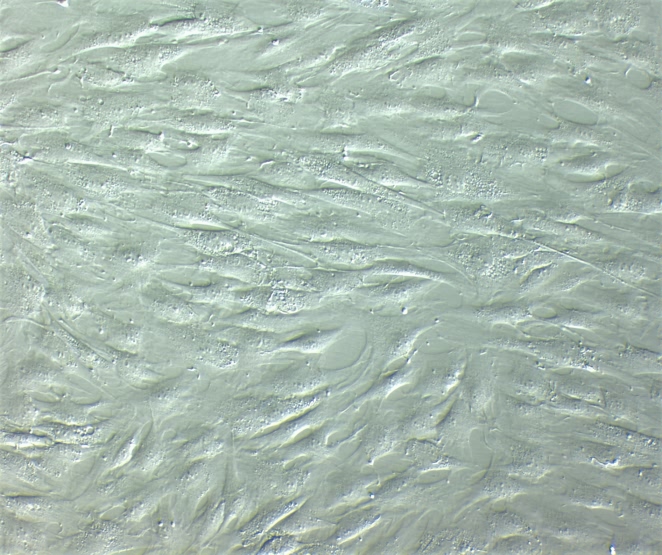मैस्टाइटिस पशुओं के उपचार के लिए मेसेनकाइमल कोशिकाओं की भूमिका
Stem cells are the undifferentiated and uncommitted cells that give rise to deferent cell types or lineage on dividing. These stem cells are used as regenerative medicine for the treatment of various diseases in human and animals.
In the present study mesenchymals Stem cells (MSC) used for the treatment of mastitis animal and it found that diseased animal treated with MSC has been cured which suggest that stem cell therapy use as regenerative medicine providing a promising area for the treatment of various diseases in animals.
Stem cells “the hope cells”:
A stem cell is a specialized cell which has the unique characteristic to develop into specialized cell types in the body and these stem cells may be used to replace cells and tissues that have been damaged due to disease.
Due to their ability to repair, regenerate, and develop into specialized cell types, Stem cells hold considerable promise as a source of cells for therapeutic applications in various conditions including metabolic, degenerative and inflammatory diseases for the repair and regeneration of damaged or lost tissues.
Stem cell therapy for animals has seen breakthroughs over past few years. The past decade has witnessed an exponential growth in treatment of diseases. In a few instances, stem-cell-based therapies produced remarkable clinical results and had a striking impact on incurable diseases.
A Sub set of adult stem cells called mesenchymal stem cells, first described by friedenstein , are multipotent cells that can be differentiated into many lineages.
They can exhibit anti inflammatory antimicrobial , immunomodulatory, anti apoptotic ,low immunogenicity, tissue regeneration capacity which fascinates researchers to explore its applications in different fields of biology.
In both human and veterinary research stem cells derived from adult tissue promises in treatment of many chronic diseases.
Application in livestock industry:
Although from past few years stem cells used as a therapeutic tool for treatment in humans but it is still in an infant stage in animal husbandry. Among the entire domesticated species cow play a important role in economy of live stock industry with the production of 811 million tons of milk.
There are certain conditions like lameness, mastitis, metritis etc which negatively reflects on the milk production as well as the reproductive efficiency of the cattle. This causes loss of economically and genetically sound animals. Our attempt to explore the use of mesenchymal stem cells (Fig.1) for treating mastitis gives promising results in treating these diseases in effective way.
 Fig.1 Microscopic image of mesenchymal stem cells
Fig.1 Microscopic image of mesenchymal stem cells
Mesenchymal Stem Cells (MSC) in bovine Mastitis:
Bovine Mastitis is an inflammation of mammary gland causing heavy economic losses worldwide. There is a 200 billion dollar loss through mastitis only in US. Bovine mastitis causes physical, chemical, usually bacteriological changes in milk and pathological changes in glandular tissues of the udder which affect the quality and quantity of milk.
Many reports suggested that MSCs have antibacterial properties against mastitis-causing pathogen S. aureus. At the infection site, exposure of MSC increases production of several paracrine factors including VEGF, SDF-1, and IL-6, that are involved in the activation of inflammatory cells to infected area and reduce the bacterial infection on the target site and help in the prevention cure of mastitis.
MSC in wound healing:
Normal wound healing is a vigorous and complex process which involves a series of events, including bleeding, coagulation, acute inflammation, cell migration, proliferation, differentiation etc. however this process required long time to heal.
Apart from this treatment with MSC require comparable less time to other chemical or drug treatments. Region behind is that after administration of MSCs to wounds area improves wound healing by speed up epithelialization, granulation tissue formation and increasing angiogenesis.
Mesenchymal Stem Cells therapy is promising area particularly critical wounds which are difficult to heal heal.
Conclusion:
Using of MSC as regenerative medicine has the potential to revolutionize the treatment of many diseases and injuries. Form the above results it can be safely stated that MSCs can be used as an alternative regenerative medicine and it shows more healing when applied locally in udder or on wounds.
Authors:
Vinay Kumar Mehra and Vinay Bhaskar
Animal Biotechnology centre
ICAR-National Dairy Research Institute, Karnal132001 (Haryana)
Email:
